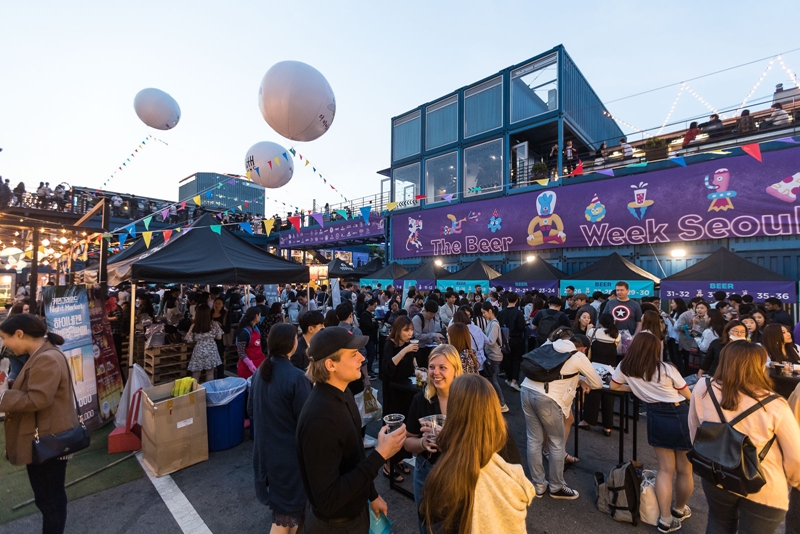- 한국어
- English
- 日本語
- 中文
- العربية
- Español
- Français
- Deutsch
- Pусский
- Tiếng Việt
- Indonesian

The government on Dec. 8 announced an innovation strategy for tourism exports with the goal of attracting next year 20 million foreign tourists and generating USD 24.5 billion in related revenue. Shown are foreign visitors in June at The Beer Week Seoul held at Common Ground, the first domestic pop-up store built with shipping containers, in the capital's Gwangjin-gu District. (Korea Tourism Organization's official Facebook page)
By Cao Thi Ha
The government's tourism goals for next year are attracting 20 million foreign visitors and generating USD 24.5 billion in related revenue.
Prime Minister Han Duck-soo on the afternoon of Dec. 8 announced this after releasing a strategic plan to innovate tourism exports while chairing a meeting on national tourism strategy at the Asia Culture Center in Gwangju's Dong-gu District.
The strategy is to first raise tourism convenience in sectors like immigration, shopping and transportation to secure international competitiveness in the post-COVID-19 race to attract tourists.
The plan also enhances accessibility to immediate refunds at duty-free stores, increasing their share to 40% of all post-tax outlets. From Jan. 1, the limit for such a refund will be doubled from KRW 500,000 to KRW 1 million per payment and the cumulative cap from KRW 2.5 million to KRW 5 million.
Additionally, planned partnerships with 1.8 million zero-pay merchants including Alipay, WeChat and UnionPay of China, TrueMoney of Thailand and OCBC Bank of Singapore will allow foreign tourists to pay using popular apps of their respective countries.
For higher mobility convenience, the government will team up with the private sector to develop a mobility app exclusively for foreign tourists to allow them to reserve public transportation such as trains, buses and taxis as well as expand tourist interpretation and guidance using artificial intelligence.
To coincide with the promotional campaign Visit Korea Year 2023-24, the shopping extravaganza Korea Grand Sale will run from next month through February, followed by the Korea Beauty Festival in June and a large-scale Hallyu festival in September to attract Korean culture fans from around the world.
The K-Tourism Roadshow, which promotes Korean culture and tourism, will be held in 25 global cities, up from 15, and tourism promotion offices will be opened in 10 more countries including Saudi Arabia, Sweden and New Zealand.
The K-Tourism and Culture Zone at Incheon International Airport, the starting and ending point of domestic tourism, will offer immersive content and interactive experiences. Foreign youth can also apply for a visa to participate in Korean culture training programs.
Customized products for medical tourism will be developed to apply domestic medical technology. The plan is to boost this sector by doubling the duration of related long-term (G-1-10) visas from one year to two if the purpose of treatment is recognized.
Infrastructure expansion will also seek to stimulate tourism in the provinces. From next year, the launch of a 10-year project to develop tourism in the southern region will see investment of KRW 3 trillion in the cities of Busan, Gwangju and Ulsan and provinces of Jeollanam-do and Gyeongsangnam-do to create stay and experience-oriented tourist attractions by region.
In addition, support will go toward finding tourism content with regional characteristics to make the country one huge tourist destination. By discovering representative food content in all five national regions, the government will establish and promote abroad the so-called K-Gourmet Belt 30 to jumpstart gourmet tourism in the country.
"Due to COVID-19, the number of foreign tourists plummeted from more than 17 million to 970,000 in 2021, resulting in difficult times for the (tourism) industry, country and regional economies," Prime Minister Han said at the meeting.
"Fortunately, the tourism market is showing recovery signs, with the visitor figure seen to exceed 10 million this year for the first time in four years, so the government should make every effort to ensure that our tourism industry in 2024 achieves its best performance in history."
shinn11@korea.kr
Most popular
- Grammy-winning producer calls Suga of BTS 'amazing artist'
- 'Universal love, family' themes fuel success of 'King of Kings': director
- Council sets minimum hourly wage in 2026 at KRW 10,320
- Export deal for K2 tank concluded with Poland for KRW 9T
- Songs from animated K-pop film rule Spotify daily chart in US
